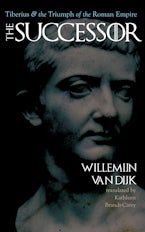Politics, prestige, power—monster, angel, emperor.
Tiberius’ unique position as the unrivaled leader of the ancient Roman Empire has not prevented him from being pushed to the sidelines of historical interest. In The Successor, Willemijn van Dijk seeks to remedy this relegation in her compelling portrait of a complicated ancient ruler.
Tiberius inherited power from the legendary Augustus as the Roman Empire’s first successor. His influence stretched from northern Africa to the southern Netherlands and from Spain to Syria. Yet despite its many challenges, this vast area would not remain unmanaged for long. In his twenty-three-year reign as emperor, Tiberius consolidated power in the new form of government his adoptive father had founded, and in doing so he established the Julio-Claudian dynasty, a line that would rule Rome for half a century.
The story of Tiberius is one of intrigue. Van Dijk draws readers onto backstreets and into back rooms, bringing Rome to life with vivid portrayals of what it was like to stand on the great Palatine Hill or by the banks of the Tiber. Against this vibrant urban tapestry, van Dijk weaves together the gripping narrative of Tiberius’ rise—a complicated game of power, politics, and conspiracy. Van Dijk strips away the varnish of myth to paint an accurate, incisive picture of a man who at the late age of fifty-five became the greatest commander-in-chief of his day.
Vivid, scandalous, and thought-provoking, The Successor tells the story of a somber man—a figure neither wholly sympathetic nor entirely repulsive—who became an emperor, and of an emperor who became a tyrant.

